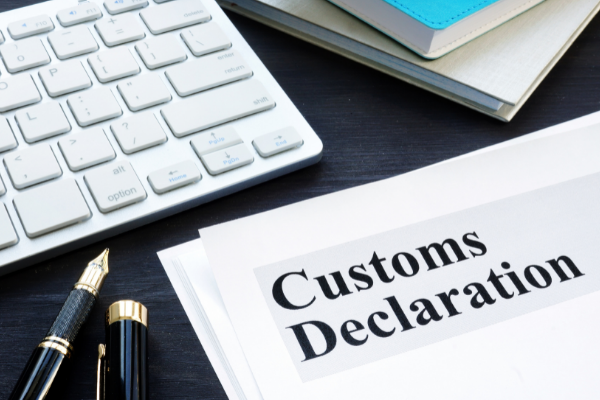BY:
SHARE:

For SMEs and newcomers, Customs mistakes are more than just annoying; they can result in financial losses, cause delays, and even block shipments entirely. Let’s break down five mistakes beginners often make and how to tackle them early, so your first steps in trade are confident, not chaotic.
Mistake 1: Wrong Tariff Classification
What happens: Assigning the wrong HS code leads to incorrect duties, and HMRC won’t hesitate to correct you, which could lead to unexpected additional costs.
Fix it: Use a Tariff tool and double-check HS chapters, section notes, and if needed, seek help—HMRC has a classification enquiries team. For hands-on practice, look into technical workshops like Strong & Herd’s Tariff Classification Explained.
Mistake 2: Misusing Incoterms® Rules
What happens: Misapplying terms like EXW or DDP can leave your business with unanticipated shipping costs, Customs liabilities, or expose you to non-compliant declarations made by agents selected by your customers/suppliers.
Fix it:
- Choose terms that fit your logistics reality. Don’t agree to EXW if you’re arranging collection, or DDP if you can’t handle Customs clearance in the buyer’s country.
- Check who controls the paperwork. Ensure that the party responsible under the chosen Incoterm has the necessary resources and authority to handle export/import declarations correctly.
- Align with your freight partners. Speak to your forwarder or Customs broker before confirming terms, so they can flag any risks or costs you might not be aware of.
- Document responsibilities. Specify in contracts or purchase orders who is responsible for covering transport, insurance, and duties — don’t rely on assumptions.
- Train your team. Ensure that sales, logistics, and finance staff are all familiar with how Incoterms work, so that no one commits the business to obligations it can’t meet.
Mistake 3: Ignoring CDS Requirements
What happens: Are you one of the companies that still refer to the old CHIEF box numbers instead of the data elements (DEs) required on the Customs Declaration Service (CDS)? Others apply outdated CHIEF codes that are no longer in use. This leads to rejected declarations, delays in clearance, or costly amendments from your broker.
Fix it: Familiarise yourself with the CDS declaration data you need. Courses such as our Advanced CDS Technical Workshop or Introduction to Customs Procedures provide you with real-life tools, including duty reliefs and CDS elements. Ensure that your references, procedures, and document codes have been updated for CDS. Create an internal reference guide. Translate your most common shipments from “old CHIEF box numbers” into the equivalent CDS DEs, so staff can adapt quickly. Train your team.
Mistake 4: Getting Origin Wrong
What happens: Businesses claim preferential duty rates under trade agreements without holding the correct evidence of origin. Using an invalid statement on origin, or assuming supplier declarations are enough, can trigger HMRC audits, duty reclaims, and penalties. Errors often occur when confusing the country of dispatch with the country of origin, relying on suppliers who can’t prove origin, or failing to maintain the required declarations and supporting records for the proper length of time.
Fix it: Understand the rules of origin. Each trade agreement has specific product rules (e.g., percentage of local content, changes in Tariff headings). Check the exact rule for your goods. Audit your supply chain. Don’t assume — verify that your suppliers can substantiate origin claims if challenged. If necessary, get valid supplier declarations. If you’re using suppliers’ statements, ensure they are correctly worded, signed, and renewed annually if required.
Mistake 5: Incomplete Record-Keeping
What happens: Failing to keep complete Customs records means you can’t prove compliance during an HMRC audit. Missing evidence of export, duty relief claims, or licence usage can result in demands for back duty, fines, or suspension of reliefs. Many businesses fail because they only keep shipping documents, but not the full trail linking export/import declarations to licences and commercial paperwork.
Fix it: Build a complete audit trail. Keep everything connected to each movement: Customs declarations, invoices, packing lists, licences, end-use statements, correspondence, and proof of export/import. Go digital where possible. Use document management systems or shared drives to link records by shipment or declaration reference number. Test yourself. Conduct an internal “mock audit” annually. Can you pull together a complete set of records for a random shipment within 30 minutes? If not, you’re at risk.
So, there you have it, five of the most common (and costly) Customs slip-ups. The truth is, nobody sets out to misclassify goods, pick the wrong Incoterm®, or lose a stack of export evidence in the office recycling bin. However, without the right know-how, these mistakes can creep in quickly, and HMRC doesn’t hand out sympathy cards. The good news? Customs isn’t black magic.
With the proper training, a bit of structure, and maybe one less spreadsheet that only Bob from Accounts can understand, you can keep your shipments smooth and your compliance tight.
Think of training as the sat-nav for your trade journey: sure, you might find your way without it, but why risk detours, fines, and dead ends? Courses like Strong & Herd’s are designed to give you the shortcuts, the “watch out for this” warnings, and the confidence to ship without stress. So don’t just avoid mistakes, get ahead of them. Your future self (and your Customs broker) will thank you.
OneCall™ Email assistance as and when required; A one-call solution for all your import, export and customs enquiries. Export help. Import help. Customs help.
Stay informed about customs and international trade matters by subscribing to our OneCall™ service. This comprehensive offering includes a dedicated email helpline for support, timely practical updates direct to your inbox (Did You Know?), monthly UK Customs & Trade Briefings and access to an interactive members' area with an exclusive community for our subscribers.
International Trade Updates & Spotlight Newsletter
Subscribe to our free information emails covering international trade topics...
MORE INDUSTRY INSIGHTS...












